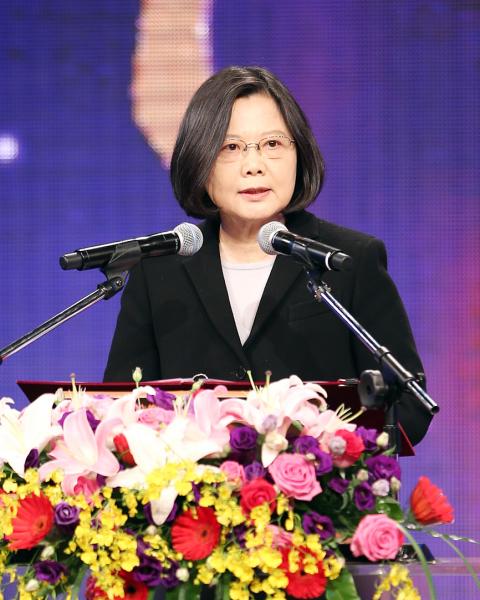The Presidential Office yesterday thanked the US government for deepening Taiwan-US relations, saying that it hopes to further improve ties with the administration of US president-elect Donald Trump.
The government thanked the administration of US President Barak Obama for its support over the past eight years, including selling arms to Taiwan, helping enhance Taiwan’s self-defense capabilities, upgrading bilateral trade and economic relations and helping Taiwan participate in international activities, Presidential Office spokesman Alex Huang (黃重諺) said in a statement.
“As a democracy, just like the United States, we also thank the US government for not treating its relationship with Taiwan as subordinate to or an extension of US relations with other nations and for strengthening Taiwan-US relations step by step,” Huang said. “Taiwan hopes to strengthen its relations with the incoming Trump administration on this robust foundation for bilateral relations.”

Photo: Chen Yi-kuan Taipei Times
The administration of President Tsai Ing-wen (蔡英文) is committed to maintaining the “status quo” of peace across the Taiwan Strait, the statement said.
“It is our government’s abiding position to maintain Taiwan’s freedom and democracy and to maintain peace in the Taiwan Strait and the ‘status quo’ of peace and stability in cross-strait relations,” Huang said.
Huang’s remarks followed comments by Obama on Taiwan and China on Friday at his year-end news conference, his last before departing the White House on Jan. 20.
It was the first time Obama spoke extensively about the Taiwan-US-China relationship since Trump made remarks questioning Washington’s “one China” policy, under which the US acknowledges, but does not necessarily accept, Beijing’s position that there is only “one China.”
Obama was answering a question on whether the US’ policy toward China could use a fresh approach, as suggested by Trump’s recent comments, in which he appeared to say that he would not necessarily be bound by the US’ “one China” policy, unless it received trade concessions from Beijing.
There has been a long-standing agreement between China, the US and, to some degree, Taiwanese, and that is to not change the “status quo,” Obama said.
“China views Taiwan as part of China, but recognizes that it has to approach Taiwan as an entity that has its own ways of doing things,” Obama said. “The Taiwanese have agreed that as long as they’re able to continue to function with some degree of autonomy, that they won’t charge forward and declare independence.”
“And that ‘status quo,’ although not completely satisfactory to any of the parties involved, has kept the peace and allowed the Taiwanese to be a pretty successful economy and a people who have a high degree of self-determination,” he said.
However, he warned against changing the “status quo.”
“But understand, for China, the issue of Taiwan is as important as anything on their docket. The idea of ‘one China’ is at the heart of their conception as a nation,” Obama said.

NATIONAL SECURITY THREAT: An official said that Guan Guan’s comments had gone beyond the threshold of free speech, as she advocated for the destruction of the ROC China-born media influencer Guan Guan’s (關關) residency permit has been revoked for repeatedly posting pro-China content that threatens national security, the National Immigration Agency said yesterday. Guan Guan has said many controversial things in her videos posted to Douyin (抖音), including “the red flag will soon be painted all over Taiwan” and “Taiwan is an inseparable part of China,” while expressing hope for expedited “reunification.” The agency received multiple reports alleging that Guan Guan had advocated for armed reunification last year. After investigating, the agency last month issued a notice requiring her to appear and account for her actions. Guan Guan appeared as required,

Japan and the Philippines yesterday signed a defense pact that would allow the tax-free provision of ammunition, fuel, food and other necessities when their forces stage joint training to boost deterrence against China’s growing aggression in the region and to bolster their preparation for natural disasters. Japan has faced increasing political, trade and security tensions with China, which was angered by Japanese Prime Minister Sanae Takaichi’s remark that a Chinese attack on Taiwan would be a survival-threatening situation for Japan, triggering a military response. Japan and the Philippines have also had separate territorial conflicts with Beijing in the East and South China

A strong cold air mass is expected to arrive tonight, bringing a change in weather and a drop in temperature, the Central Weather Administration (CWA) said. The coldest time would be early on Thursday morning, with temperatures in some areas dipping as low as 8°C, it said. Daytime highs yesterday were 22°C to 24°C in northern and eastern Taiwan, and about 25°C to 28°C in the central and southern regions, it said. However, nighttime lows would dip to about 15°C to 16°C in central and northern Taiwan as well as the northeast, and 17°C to 19°C elsewhere, it said. Tropical Storm Nokaen, currently

PAPERS, PLEASE: The gang exploited the high value of the passports, selling them at inflated prices to Chinese buyers, who would treat them as ‘invisibility cloaks’ The Yilan District Court has handed four members of a syndicate prison terms ranging from one year and two months to two years and two months for their involvement in a scheme to purchase Taiwanese passports and resell them abroad at a massive markup. A Chinese human smuggling syndicate purchased Taiwanese passports through local criminal networks, exploiting the passports’ visa-free travel privileges to turn a profit of more than 20 times the original price, the court said. Such criminal organizations enable people to impersonate Taiwanese when entering and exiting Taiwan and other countries, undermining social order and the credibility of the nation’s